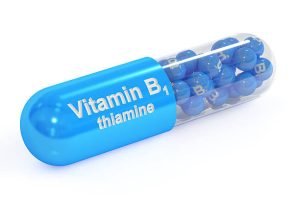Thiamin, also known as vitamin B1, is a water-soluble vitamin that is essential for the body’s metabolism of carbohydrates, proteins, and fats. It plays a crucial role in converting food into energy and is important for the proper functioning of the nervous system, muscles, and heart.
The recommended daily intake of thiamin varies depending on age, sex, and specific health conditions. For adults, the recommended daily intake is 1.1-1.2 mg for men and 0.8-1.1 mg for women. Pregnant and breastfeeding women may require higher amounts.
Thiamin is found naturally in a variety of foods. Good sources of thiamin include whole grains (such as brown rice, whole wheat bread, and oatmeal), legumes (such as lentils and beans), nuts and seeds (such as sunflower seeds and peanuts), pork, and fortified cereals.

Dietary supplements containing thiamin are available and can be used to ensure adequate intake, especially for individuals who may have difficulty meeting their thiamin needs through diet alone. Thiamin is commonly included in multivitamin supplements and is also available as a standalone supplement.
Thiamin deficiency can lead to a condition called beriberi, which is characterized by symptoms such as weakness, fatigue, nerve damage, and cardiovascular problems. Alcoholics, individuals with malabsorption disorders, and those with a diet lacking in thiamin-rich foods are at a higher risk of developing thiamin deficiency.
Thiamin has been studied for its potential health benefits in various conditions, including heart disease, Alzheimer’s disease, and diabetes. Some research suggests that thiamin supplementation may help improve heart function, cognitive function, and blood sugar control. However, more research is needed to fully understand the effects of thiamin supplementation on these conditions.
Excessive intake of thiamin from food sources is generally not a concern, as the body can easily excrete excess amounts. However, high-dose thiamin supplements may cause side effects such as stomach upset, nausea, and allergic reactions in some individuals. It is important to consult with a healthcare professional before starting any new dietary supplement and to follow the recommended dosage guidelines.

